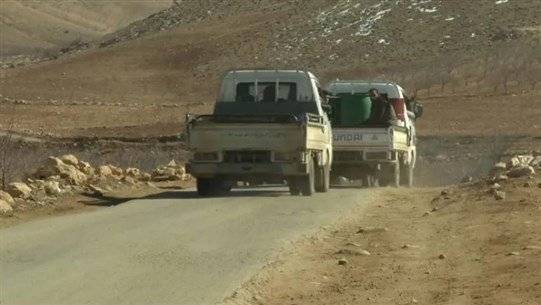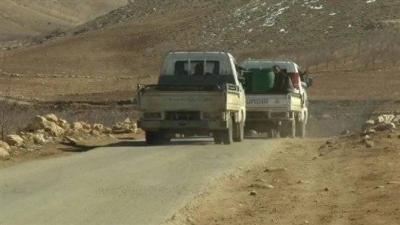Recently, smuggling operations across illegal crossings between Lebanon and Syria have significantly expanded along the lengthy 375-kilometer stretch of the Lebanese-Syrian border in eastern Lebanon. Smugglers have resumed their activities, which now encompass not only fuel, vegetables, and livestock but also bread, cigarettes, and items related to cosmetic procedures. They exploit the "Caesar" law, which prevents companies from supplying imported goods into Syria, and benefit from price disparities between Lebanon and Syria, particularly for imported goods not produced in Syria, alongside a shortage of essential materials in the Syrian market, such as fuel and non-essential medical supplies, including cosmetic injections and related items.
Security sources in eastern Lebanon reported to Al-Sharq Al-Awsat that the borders have become open at multiple points, extending beyond the known smuggling routes in northeastern Lebanon. Smuggling paths now include uninhabited areas stretching from Yanta and Wadi Al-Asha'ir to the Shebaa - Beit Jinn axis in the south, traversing the Eastern Mountain Range of Lebanon, Qusayya, and Ain Zebdeh in the center, and Nahle and Arsal towards Flita, reaching the northern Beqaa in the far northeast of the country, which consists of eleven illegal crossings spanning 22 kilometers from Al-Qaa in the east to the illegal Al-Qasr border crossing in the north.
Reports indicate that smuggling activities gradually intensified after the Lebanese army's "Fajr al-Jroud" operations, aimed at clearing border regions of extremist groups in the summer of 2017, peaking now in 2022. Civil society actors in the region note that weakened security control and the inability of official Lebanese forces to cover the 375-kilometer area have contributed to increased activity, despite the presence of several monitoring rooms along the eastern range, which have curtailed smuggling in vast areas and closed three old smuggling crossings on the roads of Hamm - Ma'araboun - Brital and along the eastern range. They emphasized that those roads remain tightly monitored due to the deployment of monitoring rooms operated by the Lebanese army along the Lebanese-Syrian border in the eastern range.
Since last year, as a result of the Lebanese Central Bank supporting a wide array of essential goods, the smuggling of goods has significantly increased. With changing priorities in smuggling operations based on supply and demand dynamics, the availability of goods, and their unavailability, smuggling of gasoline and fuel has remained active, although currently to a lesser extent than last year. Smugglers anticipate a resumption of gasoline smuggling soon, as the Syrian government has raised the price of the subsidized gasoline canister from 1,100 Syrian pounds to 2,500 Syrian pounds (approximately $0.90 based on the official exchange rate set by the Syrian central bank) with a tax equivalent to 130%. However, gasoline is scarce, and unsanctioned gasoline is available in certain areas for around 4,000 Syrian pounds per liter. At the same time, the smuggling of flour and subsidized Lebanese bread has intensified across most crossings.
The increase in flour and bread smuggling has had repercussions on the Lebanese market, leading to shortages of government-subsidized bread and flour. Last week, the price of a 50-kilogram sack of flour in the Beqaa region reached 1.5 million Lebanese pounds ($50), and a loaf of bread hit 30,000 Lebanese pounds ($1) before becoming available again starting last week due to government support for bread and flour.
Recently, operations to smuggle Lebanese national cigarettes have increased, with traders pricing tobacco in U.S. dollars, bringing the price of a pack to half a dollar. The price of foreign cigarettes has also risen due to smuggling activities and increased demand. Traders sell cigarettes in small quantities at high prices, as they prefer to receive payments for smuggled tobacco in hard currency, while there is a severe shortage of various types of tobacco, with some disappearing from the markets.
With the global decline in oil prices, smuggling of vegetable oils has intensified, alongside the smuggling of cosmetic items such as Botox and fillers, which do not enter the Syrian market due to the sanctions imposed by the "Caesar" law. The head of the Pharmacy Syndicate, Joe Saloum, complained about the smuggling of Syrian medications into Lebanon while some drugs are being smuggled from Lebanon to Syria. Last week, a unit from the Lebanese army's intelligence seized a large quantity of smuggled bread heading to Arsal en route to Syrian territory, alongside a quantity of medical supplies intended for the drug trade. A patrol from the Riyaq gendarmerie unit intercepted several boxes of foreign and national cigarettes, as well as Botox and filler injections prepared for smuggling along the central Beqaa route to Syrian territory via the monitored Qusayya crossing.




